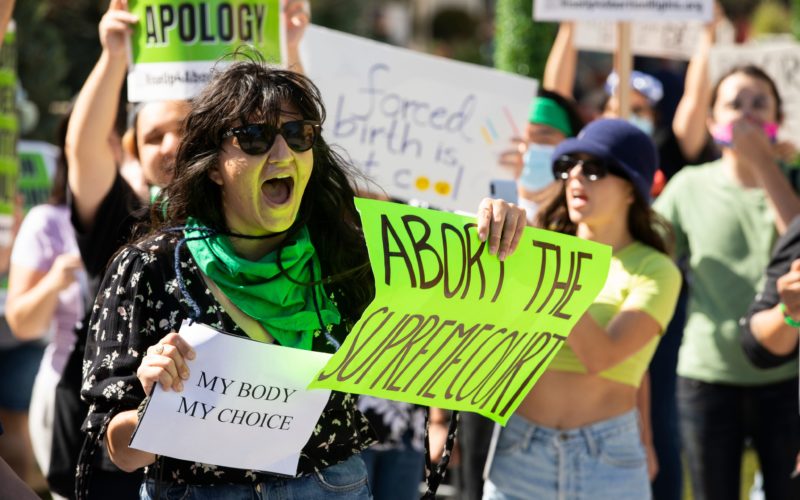Government
Supreme Court Takes On Abortion, Guns, Prayer in School—But Not Weed

An emboldened, conservative Supreme Court has churned out a torrent of seismic decisions in the last week.
The United States Supreme Court last week declined to take up a pair of cases that challenged a state’s decision to not include medical cannabis in its workers’ compensation program.
Given all of the seismic activity in the high court as of late, you are forgiven if you missed that.
From abortion to guns to prayer in school, the emboldened, conservative Supreme Court has taken on seemingly every hot button issue but cannabis, issuing a series of decisions that are poised to reshape American life and deepen the country’s polarization.
No decision rendered by the court in the last week—or perhaps in the last 50 years—has inflamed passions and divided the nation more than Dobbs v. Jackson Women’s Health Organization, which overturned Roe v. Wade and ended the constitutional right to an abortion.
In a 6-3 ruling, the court’s conservative justices effectively handed abortion policy back to the states. The result was swift, with outright abortion bans taking effect immediately in a handful of states: South Dakota, Wisconsin, Missouri, Oklahoma, Arkansas, Kentucky, and Alabama. A number of other states with their own highly restrictive abortion laws also were triggered by the ruling.
In overturning Roe, which had enshrined the right to an abortion in the United States for nearly 50 years, the court essentially laid the groundwork for a country in which abortion is widely available in liberal blue states, but severely restricted—if not outlawed completely—in conservative red states.
“Roe was egregiously wrong from the start,” Justice Samuel Alito wrote in the majority opinion. “Its reasoning was exceptionally weak, and the decision has had damaging consequences.”
The court’s liberal bloc wrote a scathing dissenting opinion.
“With sorrow—for this Court, but more, for the many millions of American women who have today lost a fundamental constitutional protection—we dissent,” the three justices wrote jointly.
The decision sparked immediate nationwide protests and is poised to animate this year’s midterm elections and the 2024 presidential campaign.
A day before it announced its decision in Dobbs, the Supreme Court handed down another decision that will likely have ripple effects throughout the country.
In a 6-3 ruling, the court struck down New York’s century-old law that imposes strict limits on an individuals’ ability to carry a gun outside their home.
Writing for the majority, Justice Clarence Thomas asserted that the Second Amendment ensures “an individual’s right to carry a handgun for self-defense outside the home.”
The law, which had been in place since 1911, required “applicants for a license to carry a gun outside of their homes to have a ‘proper cause’ to do so,” according to NBC News.
Per The New York Times, the decision “is expected to spur a wave of lawsuits seeking to loosen existing state and federal restrictions and will force five states — California, Hawaii, Maryland, Massachusetts and New Jersey, home to a quarter of all Americans — to rewrite their laws.”
On Monday, the Supreme Court continued its string of contentious decisions by ruling in favor of a Seattle area high school football coach who conducted a prayer at the 50-yard-line following his team’s games.
In yet another 6-3 ruling, the court’s majority said that the coach’s ritual is protected under the First Amendment.
“Respect for religious expressions is indispensable to life in a free and diverse republic — whether those expressions take place in a sanctuary or on a field, and whether they manifest through the spoken word or a bowed head,” Justice Neil Gorsuch wrote for the majority.
The coach, Joseph Kennedy, had been suspended by the school district when he refused to stop the post-game prayer.
Gorsuch contended that Kennedy’s prayers were done quietly and discreetly, a point that Justice Sonia Sotomayor fiercely disputed.
In her dissenting opinion, Sotomayor noted that “Kennedy consistently invited others to join his prayers and for years led student-athletes in prayer.” Her opinion also included a photo of Kennedy kneeling in prayer with a large group of players. The prayer resulted in undue pressure on members of the team, Sotomayor argued.
“Students look up to their teachers and coaches as role models and seek their approval,” Sotomayor wrote. “Students also depend on this approval for tangible benefits. Players recognize that gaining the coach’s approval may pay dividends small and large, from extra playing time to a stronger letter of recommendation to additional support in college athletic recruiting.”
Source: https://hightimes.com/news/supreme-court-takes-on-abortion-guns-prayer-in-school-but-not-weed/
Business
New Mexico cannabis operator fined, loses license for alleged BioTrack fraud

New Mexico regulators fined a cannabis operator nearly $300,000 and revoked its license after the company allegedly created fake reports in the state’s traceability software.
The New Mexico Cannabis Control Division (CCD) accused marijuana manufacturer and retailer Golden Roots of 11 violations, according to Albuquerque Business First.
Golden Roots operates the The Cannabis Revolution Dispensary.
The majority of the violations are related to the Albuquerque company’s improper use of BioTrack, which has been New Mexico’s track-and-trace vendor since 2015.
The CCD alleges Golden Roots reported marijuana production only two months after it had received its vertically integrated license, according to Albuquerque Business First.
Because cannabis takes longer than two months to be cultivated, the CCD was suspicious of the report.
After inspecting the company’s premises, the CCD alleged Golden Roots reported cultivation, transportation and sales in BioTrack but wasn’t able to provide officers who inspected the site evidence that the operator was cultivating cannabis.
In April, the CCD revoked Golden Roots’ license and issued a $10,000 fine, according to the news outlet.
The company requested a hearing, which the regulator scheduled for Sept. 1.
At the hearing, the CCD testified that the company’s dried-cannabis weights in BioTrack were suspicious because they didn’t seem to accurately reflect how much weight marijuana loses as it dries.
Company employees also poorly accounted for why they were making adjustments in the system of up to 24 pounds of cannabis, making comments such as “bad” or “mistake” in the software, Albuquerque Business First reported.
Golden Roots was fined $298,972.05 – the amount regulators allege the company made selling products that weren’t properly accounted for in BioTrack.
The CCD has been cracking down on cannabis operators accused of selling products procured from out-of-state or not grown legally:
- Regulators alleged in August that Albuquerque dispensary Sawmill Sweet Leaf sold out-of-state products and didn’t have a license for extraction.
- Paradise Exotics Distro lost its license in July after regulators alleged the company sold products made in California.
Golden Roots was the first alleged rulebreaker in New Mexico to be asked to pay a large fine.
Source: https://mjbizdaily.com/new-mexico-cannabis-operator-fined-loses-license-for-alleged-biotrack-fraud/
Business
Marijuana companies suing US attorney general in federal prohibition challenge

Four marijuana companies, including a multistate operator, have filed a lawsuit against U.S. Attorney General Merrick Garland in which they allege the federal MJ prohibition under the Controlled Substances Act is no longer constitutional.
According to the complaint, filed Thursday in U.S. District Court in Massachusetts, retailer Canna Provisions, Treevit delivery service CEO Gyasi Sellers, cultivator Wiseacre Farm and MSO Verano Holdings Corp. are all harmed by “the federal government’s unconstitutional ban on cultivating, manufacturing, distributing, or possessing intrastate marijuana.”
Verano is headquartered in Chicago but has operations in Massachusetts; the other three operators are based in Massachusetts.
The lawsuit seeks a ruling that the “Controlled Substances Act is unconstitutional as applied to the intrastate cultivation, manufacture, possession, and distribution of marijuana pursuant to state law.”
The companies want the case to go before the U.S. Supreme Court.
They hired prominent law firm Boies Schiller Flexner to represent them.
The New York-based firm’s principal is David Boies, whose former clients include Microsoft, former presidential candidate Al Gore and Elizabeth Holmes’ disgraced startup Theranos.
Similar challenges to the federal Controlled Substances Act (CSA) have failed.
One such challenge led to a landmark Supreme Court decision in 2005.
In Gonzalez vs. Raich, the highest court in the United States ruled in a 6-3 decision that the commerce clause of the U.S. Constitution gave Congress the power to outlaw marijuana federally, even though state laws allow the cultivation and sale of cannabis.
In the 18 years since that ruling, 23 states and the District of Columbia have legalized adult-use marijuana and the federal government has allowed a multibillion-dollar cannabis industry to thrive.
Since both Congress and the U.S. Department of Justice, currently headed by Garland, have declined to intervene in state-licensed marijuana markets, the key facts that led to the Supreme Court’s 2005 ruling “no longer apply,” Boies said in a statement Thursday.
“The Supreme Court has since made clear that the federal government lacks the authority to regulate purely intrastate commerce,” Boies said.
“Moreover, the facts on which those precedents are based are no longer true.”
Verano President Darren Weiss said in a statement the company is “prepared to bring this case all the way to the Supreme Court in order to align federal law with how Congress has acted for years.”
While the Biden administration’s push to reschedule marijuana would help solve marijuana operators’ federal tax woes, neither rescheduling nor modest Congressional reforms such as the SAFER Banking Act “solve the fundamental issue,” Weiss added.
“The application of the CSA to lawful state-run cannabis business is an unconstitutional overreach on state sovereignty that has led to decades of harm, failed businesses, lost jobs, and unsafe working conditions.”
Business
Alabama to make another attempt Dec. 1 to award medical cannabis licenses

Alabama regulators are targeting Dec. 1 to award the first batch of medical cannabis business licenses after the agency’s first two attempts were scrapped because of scoring errors and litigation.
The first licenses will be awarded to individual cultivators, delivery providers, processors, dispensaries and state testing labs, according to the Alabama Medical Cannabis Commission (AMCC).
Then, on Dec. 12, the AMCC will award licenses for vertically integrated operations, a designation set primarily for multistate operators.
Licenses are expected to be handed out 28 days after they have been awarded, so MMJ production could begin in early January, according to the Alabama Daily News.
That means MMJ products could be available for patients around early March, an AMCC spokesperson told the media outlet.
Regulators initially awarded 21 business licenses in June, only to void them after applicants alleged inconsistencies with how the applications were scored.
Then, in August, the state awarded 24 different licenses – 19 went to June recipients – only to reverse themselves again and scratch those licenses after spurned applicants filed lawsuits.
A state judge dismissed a lawsuit filed by Chicago-based MSO Verano Holdings Corp., but another lawsuit is pending.
Source: https://mjbizdaily.com/alabama-plans-to-award-medical-cannabis-licenses-dec-1/
-

 Business2 years ago
Business2 years agoPot Odor Does Not Justify Probable Cause for Vehicle Searches, Minnesota Court Affirms
-

 Business2 years ago
Business2 years agoNew Mexico cannabis operator fined, loses license for alleged BioTrack fraud
-

 Business2 years ago
Business2 years agoAlabama to make another attempt Dec. 1 to award medical cannabis licenses
-

 Business2 years ago
Business2 years agoWashington State Pays Out $9.4 Million in Refunds Relating to Drug Convictions
-

 Business2 years ago
Business2 years agoMarijuana companies suing US attorney general in federal prohibition challenge
-

 Business2 years ago
Business2 years agoLegal Marijuana Handed A Nothing Burger From NY State
-

 Business2 years ago
Business2 years agoCan Cannabis Help Seasonal Depression
-

 Blogs2 years ago
Blogs2 years agoCannabis Art Is Flourishing On Etsy











